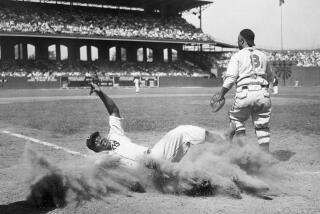Monroe Is No Longer Like a Fish Out of Water
- Share via
AUGUSTA, Ga. — Ish Monroe arrived at the big fishing tournament feeling lucky.
The Modesto angler flew to Alabama, hooked his $40,000 bass boat to his fancy truck, and negotiated the highways and back roads without a hitch.
Flashing blue lights did not appear in his rearview mirror. There were no drug-sniffing dogs and no handcuffs -- not a single “DWB” episode.
That’s short for Driving While Black, he explained before the start of the Pride of Augusta bass fishing event on Clarks Hill Reservoir in nearby Columbia County.
Monroe, 31, is the only African American on the CITGO Bassmaster Elite Series Tournament, the world’s premier circuit, which swings through the Southwest and Deep South before tracking north.
In nine years fishing in BASS tour events, he says he has been pulled over for “routine checks” more times than he cares to remember. Once he was hauled to jail and required the help of a fellow competitor to get his vehicle out of impound. Another time he was asked to stand aside while a canine unit gave his rig a once-over.
“It’s just a negative experience to know that things like that still exist,” Monroe said. “I mean, the Confederate flag still flies in some places, and that’s just wrong.”
Such things may still exist, but an interesting transformation has occurred. After years of struggling, Monroe began posting high finishes and qualifying for the Bassmaster Classic, the Super Bowl of the sport. At this year’s season opener in Texas, he became the first black angler to win a BASS event with a four-day total weight of 104 pounds 8 ounces for 20 fish. (All fish in the BASS competitions are released after being caught.)
By emerging as a star in one of the last white bastions of sport, he not only gained the respect of his peers, but widespread acceptance among fans.
“I’d like to learn from him,” said a smiling Andy MacAfee, 36, moments after Monroe signed a cap for his 3-year-old son, Ryan.
Monroe still gets pulled over occasionally, he said. But nowadays the cops, themselves fishermen, mostly just want to chat.
“It’s funny,” the fisherman said through a grin. “I’ll be driving down and they’ll throw their lights on and I’m like, ‘You’ve got to be kidding me.’ And they’re like, ‘Ish, we just wanted to get your autograph.’ ”
*
As a child, Monroe’s only concern, once he made his first catch in Michigan when he was 2, was whether there would be enough time to do all the fishing he wanted to do.
His parents never married and when they split and his mother moved to San Francisco, his father, now a Bay Area fireman, eventually followed to be close to his son, Ishama. They fished for carp in Golden Gate Park, trout in Lake Merced, striped bass in San Francisco Bay.
At 13, he saw his first bass-fishing tournament on TV. The winner made $5,000 and Monroe was astonished to learn that a person could get paid for fishing. The brainstorming began. He worked odd jobs, saved for a boat and entered as many regional tournaments as he could afford. After high school, he attended Contra Costa College and studied marketing and public speaking before tackling competitive bass fishing full time.
The kid thought he had the game figured out. What he’d soon realize, however, was that this business was tough. The days on the water -- up to three days of practice, then four days of competition -- were long. Competition was fierce and the pay adequate only for those who won or regularly finished near the top.
And as Monroe learned, largemouth bass are wary, and fooling them with any consistency requires skills and instincts that can take years to develop.
The talk in some Internet chat rooms predicted Monroe would never make it because he was black. And when his results improved and endorsement deals came his way, there were claims that he was only getting them because he was black.
The criticism did not come from tour members.
“Our sport does not discriminate,” said Rick Clunn, 59, a four-time Classic champion who still competes. “It doesn’t matter if you’re blue, green, black or yellow. It’s how you can handle a rod and reel.”
Monroe barely scraped by early on. He slept in cheap motels, sharing rooms with others and eating lots of peanut-butter-and-jelly sandwiches. His girlfriend left him. He ached for the comforts of home.
“There were a lot of times that he wanted to quit,” said Dean Rojas, an Arizona pro and one of Monroe’s close friends. “He would say, ‘I just can’t do it anymore.’ But he kept at it. Both of us did.”
In Monroe’s first six months on the BASS tour, with a rickety van and a Ranger boat he and his father bought, he was pulled over three times for what he was told were routine checks in Texas and Georgia.
The most humiliating experience was early in his career, when sheriffs in south Georgia took him to jail after learning there was a warrant for his arrest in California. Monroe had neglected to settle a speeding ticket back home and his license was suspended.
Bail was $1,500. Rojas and a friend drove four hours from Florida to pick up Monroe’s rig and drive it across the state line. “I took care of the ticket and everything has been fine since,” Monroe said, sheepishly.
Asked about the DWB references, Lt. Butch Askew of the Columbia County Sheriff’s Department, said, “It didn’t happen around here, I hope, because we don’t stop people for that reason.”
In any event, Monroe appears to be enjoying the last laugh. The season-opening victory in Texas was worth $100,000. His 10 career top-10 finishes have helped him land sponsors who pay him a combined six-figure salary and keep him supplied with products and equipment.
The Bassmaster Elite Series Tournament, owned by ESPN, is expanding and will probably come to California next season.
Nowhere, however, will the following be as crazy as it is in rural Southern communities. Weekend crowds of 10,000-plus accompany events such as the Pride of Augusta.
Though it remains mostly a white man’s passion -- the 28 million recreational bass anglers in the United States are predominantly white -- there seem to be more African American anglers getting involved.
It is not known how many black anglers compete in regional tournaments -- BASS sanctions 20,000 catch-and-release tournaments a year -- but the number of black participants on the big-time FLW Tour, the rival to BASS’ Elite Series Tournament, has increased to more than a dozen, tour spokesman Dave Washburn said.
About that many compete on BASS’ two lesser circuits, and BASS executive Don Rucks predicts that Monroe’s success will inspire others.
“Just like golf with Tiger Woods, we’d like to get more African Americans involved, especially at the youth level,” Rucks said.
Monroe failed to make the weekend cut at the Pride of Augusta, finishing 95th in a field of 104. Years ago, that might have made him think about going home and getting a real job. Not anymore.
“I was swinging for the fences, trying for the bigger fish I needed to make the cut, and I struck out,” he said. “It happens. I’ve got to just move on.”
And while South Carolina’s Davy Hite was playing to the crowd after a big haul, and would eventually win with a 20-fish limit totaling 56 pounds, Monroe went northbound for another tournament in Kentucky, casting glances at the mirror.
More to Read
Sign up for The Wild
We’ll help you find the best places to hike, bike and run, as well as the perfect silent spots for meditation and yoga.
You may occasionally receive promotional content from the Los Angeles Times.






